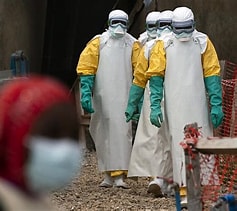
Health authorities in the Democratic Republic of Congo (DR Congo) have announced a major breakthrough in the ongoing fight against the Ebola virus in Kasai Province.
The first two patients treated for Ebola in the Bulape health zone have fully recovered and have been discharged from the local treatment centre, according to the World Health Organization (WHO) Regional Office for Africa, which disclosed the development on its official X (formerly Twitter) handle on Tuesday.
The recoveries mark an important milestone in the country’s efforts to contain the latest outbreak, which was declared on September 4, 2025, after the deadly virus re-emerged in the region.
Health officials say the positive outcome reflects strengthened clinical care and rapid response measures introduced over the past week.
WHO revealed that the successful treatments were achieved through the combined efforts of the Ministry of Health in DR Congo, supported by key international partners including Médecins Sans Frontières (MSF), ALIMA, and other humanitarian organizations working on the ground.
“Appropriate control measures are being rolled out to curb the spread of the virus, save lives, and end the outbreak as quickly as possible,” the WHO said.
As of September 4, health officials have recorded 28 suspected cases, including 15 deaths, across three areas of the Bulape health zone—Bulape, Bulape Com, and Dikolo—as well as the Mweka health zone.
The case fatality ratio stands at a worrying 54 per cent, and four healthcare workers are among the reported deaths.
The WHO noted that 80 per cent of the suspected cases are aged 15 years and older, underscoring the need for urgent containment measures.
The current outbreak comes as Central and West Africa face overlapping health and humanitarian crises, including cholera outbreaks, malnutrition, and internal displacement.
DR Congo has a long history with Ebola, recording 15 outbreaks since the virus was first identified in 1976.
Kasai Province previously experienced outbreaks in 2007 and 2008, while the country’s most recent outbreak before this one occurred in Equateur Province in April 2022, which was successfully contained within three months.
Ebola virus disease is a rare but severe and often fatal illness in humans.
The virus is believed to originate from infected animals such as fruit bats, which are considered the natural hosts.
Transmission to humans occurs through contact with the blood, secretions, organs, or other bodily fluids of infected animals.
Once in humans, the virus spreads through direct contact with blood or body fluids of an infected person, contaminated objects, or the bodies of individuals who have died from the disease.
Despite the high fatality rate and the risk of further spread, health authorities remain optimistic that swift intervention will contain the outbreak.
The recovery of the first two patients offers a sign of hope for communities in Kasai Province and beyond, as teams continue to deploy treatments, strengthen surveillance, and roll out preventive measures to halt the virus.
With continued international support and strict adherence to control protocols, officials believe the country can once again bring the outbreak under control—just as it did in previous years.